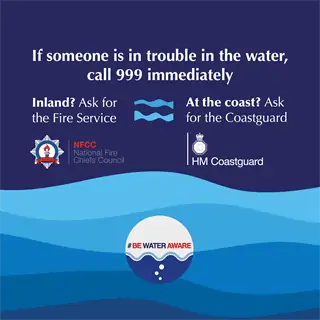Royal Berkshire Fire and Rescue Service (RBFRS) is urging Berkshire residents to ‘Be Water Aware’ as part of the National Fire Chiefs Council’s (NFCC) Drowning Prevention and Water Safety Week (26 April – 2 May).

In 2019, 223 people tragically lost their lives in accidental drownings and 44% of those people had no intention of ever being in the water. More people died in the UK in 2019 from accidental drowning than cyclists did on the road.
Royal Berkshire Fire and Rescue Service is therefore encouraging people not to become complacent when spending time in and around water, especially as COVID-19 restrictions ease and many people are expected to head to coastal locations and inland water beauty spots.
David Grayson, Watch Based Station Manager, said: “As the weather begins to warm up, please continue to take care around rivers and lakes in the Berkshire area.
“We would advise people to avoid bridge or ledge jumping, often referred to as ‘tombstoning’ at all times. Whilst air temperatures are increasing, water temperatures can still be very cold. Cold water shock can severely hamper anyone’s ability to swim, even the strongest of swimmers. Cold water shock, along with hidden objects and currents, can make entering water a very hazardous activity. If you do not know what you are jumping in to, do not jump into it!
“If you do wish to enter open water, we recommend doing so as part of an organised group, with proper safety instructions and safety measures to hand.”
The number of deaths and other injuries caused by water related incidents – many of which are sadly life-altering – can be reduced by being aware of the risks and following some simple advice.
To stay safe while spending time in and around water, please follow this advice:
- Never swim alone in case you need help.
- Don’t drink alcohol when undertaking water-related activities, it impairs judgement and your ability to swim.
- Avoid walking routes near water if you have been drinking alcohol.
- Don’t dive or jump straight into open water, this can cause potentially fatal cold water shock, even on the warmest day.
- Actively supervise children in and around water – drowning can happen quickly and silently.
- If you find yourself unexpectedly in the water, don’t panic, extend your arms and legs out and float on your back by creating a star shape with your body until the effects of cold water shock pass.
- Never enter the water to try and rescue someone, call 999 and ask for the fire and rescue service if inland and the Coastguard if you are at the coast.
To keep up to date with Drowning Prevention and Water Safety Week, look out for #BeWaterAware posts on the RBFRS Twitter, Facebook and Instagram accounts for more information and advice.